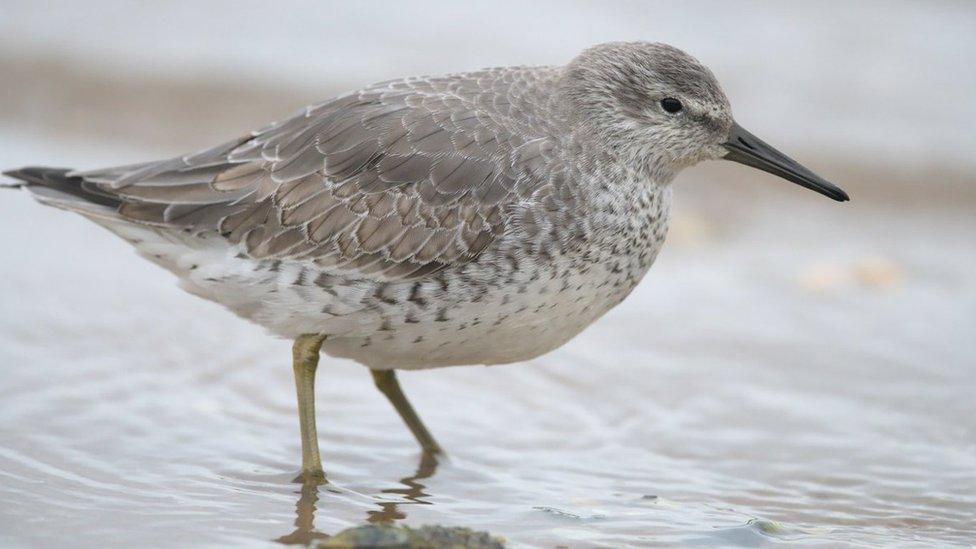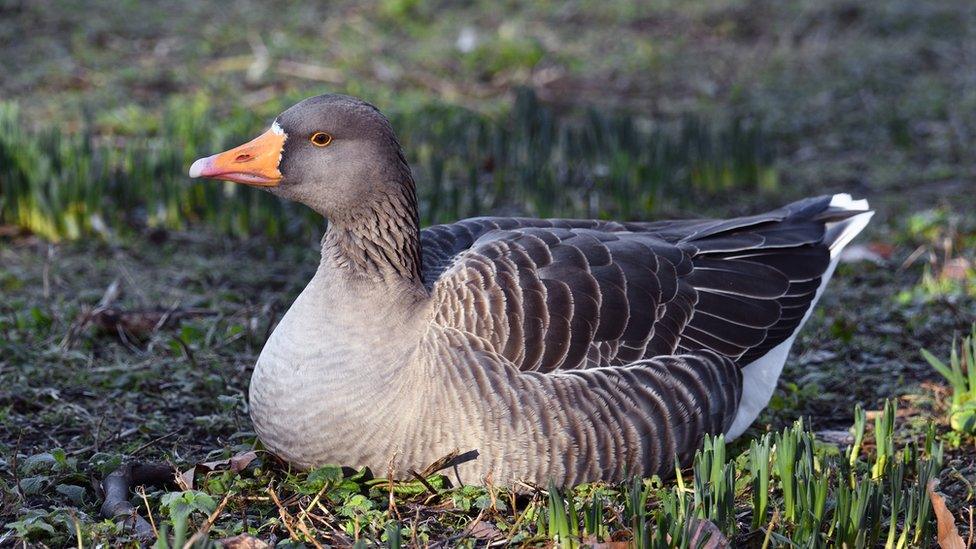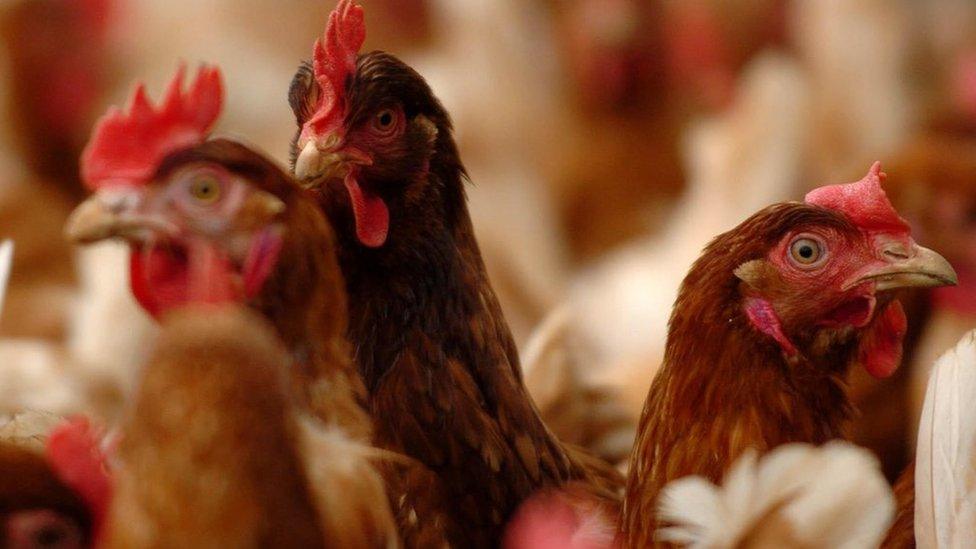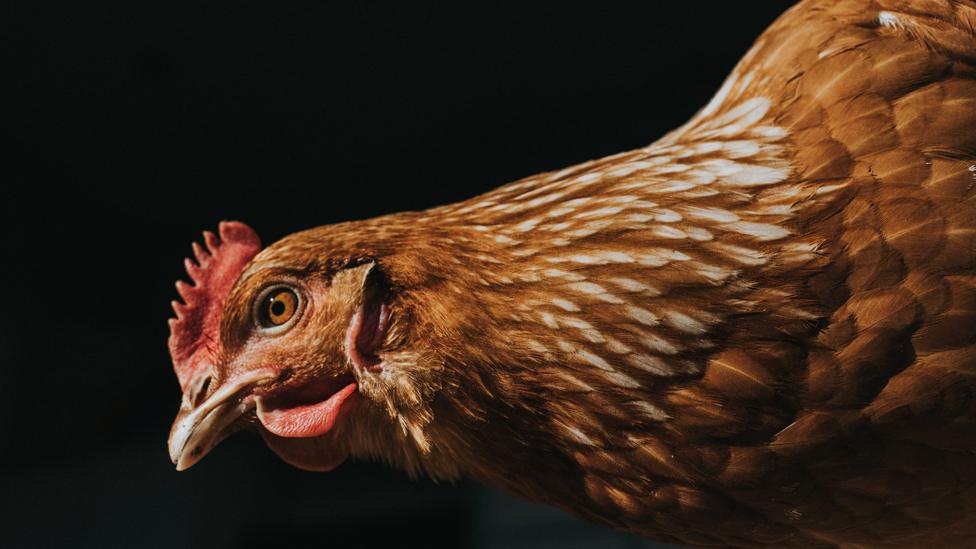Bird flu concern as charity warns of more cases in Scotland
- Published

One birdwatcher said he suspected this Knot, pictured in Aberdeenshire, had bird flu
An animal shelter has warned that bird flu could be spreading among wild species in mainland Scotland.
The New Arc charity has had "several" calls from the public reporting concern for birds in Aberdeenshire.
It comes after news broke on Friday that a flock of chickens in Orkney has been culled in Scotland's first serious case of bird flu since 2016.
Thirty-nine chickens died of bird flu and the 11 remaining birds in the affected flock were put down.
A six-mile (10km) control zone has been set up on the island of Sanday and further controls on the movement of poultry, carcasses, eggs, used poultry litter and manure and restrictions on bird gatherings are in place.
The New Arc animal shelter in Ellon, Aberdeenshire, said on its Facebook page that in recent days it had received several calls "regarding wading birds" in the Newburgh and Ythan area.
It said concern had been particularly reported about Red Knots in the area.
"One very poorly Knot was brought to us, and immediately quarantined due to our concerns of Avian Influenza, and the unusual symptoms being presented.
"The bird died soon after and was bagged and stored safely," the charity said.
Since then, it has taken "several calls" about the species.
"These lovely little birds normally race around, feeding frantically."
However, just now they are reported to be "listless", and "not moving around, not eating and sometimes away from the flock" - which, it adds, is not normal.
The post added: "If you find an ill bird (particularly swans/geese/gulls and now it would appear wader birds - please get in touch".
The charity urged people to ring ahead before bringing any unwell animal to the centre.
Low risk to human health
On Friday, Scotland's Chief Veterinary Officer Sheila Voas said the risk to human health from the H5N8 Avian Influenza was very low.
Bird keepers have been urged to comply with an order to house birds that came in to effect on 14 December.
Ms Voas said: "We have already made clear that all bird keepers - whether major businesses or small keepers with just a few birds - must ensure that their biosecurity is up to scratch to protect their birds from disease and prevent any contact between their birds and wild birds.
"Keepers who are concerned about the health or welfare of their flock should seek veterinary advice immediately. Your private vet, or your local Animal and Plant Health Agency office, will also be able to provide practical advice on keeping your birds safe from infection.
"Any dead wild swans, geese, ducks or gulls, falcons or other birds of prey or five or more dead wild birds of other species in the same location, should be reported to the Defra dead wild bird helpline."
She added that avian influenzas pose a very low food safety risk for UK consumers, and it does not affect the consumption of poultry products including eggs.
Anyone finding dead wild birds are urged to report it to the Defra helpline on 03459 33 55 77 - option 7.

Some isolated cases have of avian flu have been found in wild birds in recent weeks
Because of the number of cases in Europe and in England the risk of bird flu is currently judged to be very high for wild birds, high for poultry where there is poor biosecurity and medium for poultry with protection measures in place.
As well as the cases in Orkney, a number of isolated cases have been identified in Scotland in the last month, according to the Scottish government., external
A dead swan collected in Cupar, Fife, on 29 November had the virus.
A goose found near Golspie in the Highlands on 3 December also had the virus.
Three swans collected in Fraserburgh, Aberdeenshire, on the same date also had avian flu.
In England, a number of swans were recently found dead near the Hampshire coast and on the Isle of Wight and there were culls in Warwickshire and Worcestershire.
Earlier cases have included two farms in Norfolk, East Anglia and a wildlife centre in Gloucestershire. All 10,500 turkeys at a farm in North Yorkshire were culled following an outbreak.
BBC Scotland's environment correspondent Kevin Keane said that in theory the strain could transmit to humans but as yet there have been no cases of it anywhere in the world.
However, he said, it is highly infectious for birds and so restrictions for keepers have been put in place to lock their birds inside and away from wild birds.
Related topics
- Published18 December 2020

- Published5 December 2020

- Published18 November 2014
